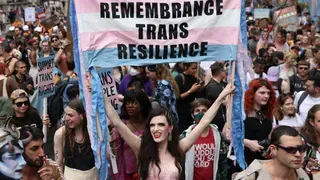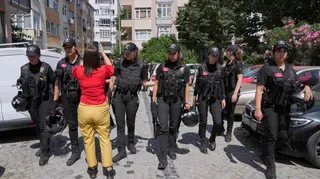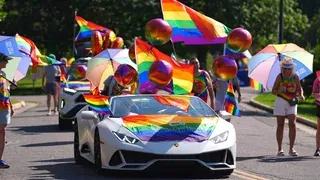May 24, 2021
Italy Eurovision Winners Return Home to Cheers, a Drug Test
Nicole Winfield and Trisha Thomas READ TIME: 4 MIN.
The Italian glam rock band that won the Eurovision Song Contest returned home Sunday to the adulation of fans, congratulations from the government and so much speculation that the lead singer had snorted cocaine during the show that he vowed to take a drug test.
"We want to shut down the rumors," Maneskin lead singer Damiano David told reporters at Rome's Leonardo da Vinci airport as the band arrived home after their victory in Rotterdam, Netherlands.
Rumors spread on social media after David was seen bending over a table during the Saturday night live television broadcast. Asked at a post-victory news conference whether he'd snorted cocaine, David said he doesn't use drugs and that he'd bent over because another band member had broken a glass at their feet.
Eurovision confirmed that broken glass was found under the table in question, but announced David had offered to take the test, which is scheduled for Monday.
In Italy, the drug claim didn't mar the praise that poured in Sunday from the Italian establishment for the victory of the rather anti-establishment Maneskin, a glam rock band that got its start busking on Rome's main shopping drag.
Their win gave Italy a sorely needed boost after a dreadful year as one of the countries worst hit by the coronavirus and will bring next year's competition back to the place where European song contests began.
The band was the bookmakers' favorite going into the Eurovision finale and sealed the win early Sunday with the highest popular vote in the enormously entertaining, and incredibly kitsch, annual song festival.
"We are out of our minds!" Florence's Uffizi Galleries tweeted, echoing Maneskin's winning song lyrics, along with an image of a Caravaggio Medusa and the hashtag #Uffizirock.
Maneskin, Danish for "moonlight" and a tribute to bass player Victoria De Angelis' Danish ancestry, won with a total of 529 points. France was second while Switzerland, which led after national juries had voted, finished third.
"It is amazing. It is amazing," band members said as they got off the plane and were met by a gaggle of reporters outside baggage claim.
De Angelis said the band was shocked at the claims of drug use, which were echoing particularly loudly in runner-up France, where mainstream media prominently reported the suspicions and the country's foreign minister, Jean-Yves Le Drian, was even asked about them on a news show Sunday.
Le Drian stayed clear on the controversy, saying: "If there is a need to do tests, they'll do tests."
De Angelis said the band wants to put the controversy behind them because drug use goes against their ethos and message.
"We are totally against cocaine and the use of drugs and we would have never done it of course, so we are shocked that many people believe this," she said.
The band got its start performing on Via del Corso, the main commercial thoroughfare in downtown Rome. Their scrappy performances in front of a Geox shoe store were a far cry from the over-the-top, flame-throwing extravaganza Saturday night that literally split David's pants.
David told a news conference this week that starting out on the street was embarrassing, since the group had to contend with other musicians vying for the same prized piece of sidewalk while neighbors complained about the noise.
"They were always calling the police," De Angelis said, laughing.
Maneskin's win was only Italy's third victory in the contest and the first since Toto Cutugno took the honor in 1990. The victory means Italy will host next year's competition, with cities bidding for the honor.
Launched in 1956 to foster unity after World War II, Eurovision evolved over the years from a bland ballad-fest to a campy, feel-good extravaganza. It has grown from seven countries to include more than 40, including non-European nations such as Israel and far-away Australia.
Legend has it that Eurovision got its inspiration from Italy's Sanremo Music Festival, which began in 1951 as a post-war effort to boost Italian culture and the economy of the Ligurian coastal city that has housed it ever since.
Perhaps best known for having launched the likes of Andrea Boccelli and one of Italy's most famous songs "Nel blu, dipinto di blu" – popularly known as "Volare" – the Sanremo festival usually picks Italy's official selection for the Eurovision contest.
Maneskin won Sanremo this year with the same song, "Zitti e Buoni" ("Quiet and good") that it performed Saturday night in Rotterdam.
De Angelis said she hoped that their victory would send a message to future Italian contestants that ballads aren't the only genre that can win contests.
"We think maybe from now on more bands will have the chance to play what they want and not be influenced by the radios or what the main genre is in Italy," she said. "They can feel themselves and play rock music too."
___
AP reporter John Leicester contributed to this report from Le Pecq, France.







